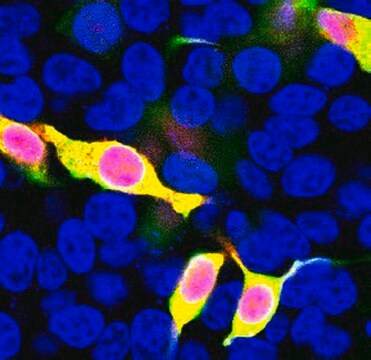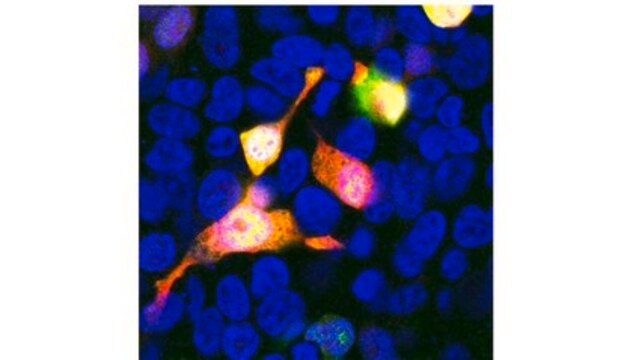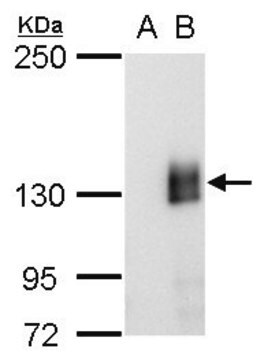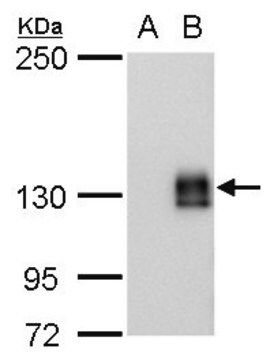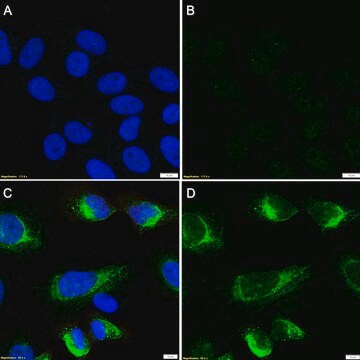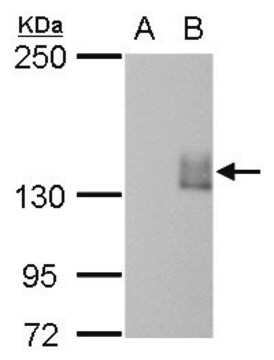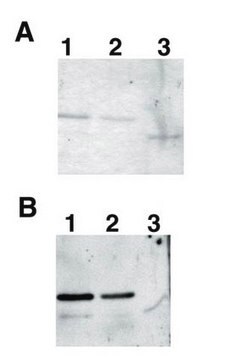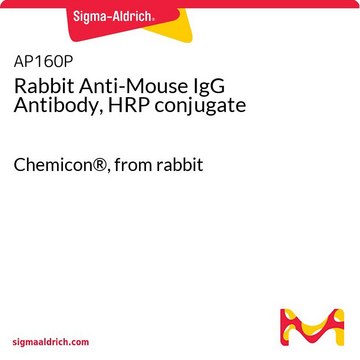AB356481
Anti-mCherry
from chicken
Iniciar sesiónpara Ver la Fijación de precios por contrato y de la organización
About This Item
UNSPSC Code:
12352203
eCl@ss:
32160702
NACRES:
NA.41
Productos recomendados
biological source
chicken
Quality Level
antibody form
unpurified
antibody product type
primary antibodies
clone
polyclonal
species reactivity (predicted by homology)
all
technique(s)
immunofluorescence: suitable
western blot: suitable
isotype
IgY
UniProt accession no.
shipped in
ambient
target post-translational modification
unmodified
General description
mCherry, red fluorescent protein, is derived from DsRed, a red fluorescent protein from disc corals of Discosoma species. DsRed is similar in size and other properties to GFP, but it produces a red rather than a green fluorescence. mCherry is a monomeric form that has been engineered with multiple cycles of mutation, directed modification and evolutionary selection. It exhibits excitation maximum at 587 nm and an emission maximum at 610 nm with a fluorescent quantum yield of 0.22. mCherry displays high photostability and resistant to photobleaching. It also displays improved brightness and extremely rapid maturation rate. Anti-mCherry, polyclonal was raised in chicken egg and the antibody preparation was dialyzed against phosphate buffered saline. This antibody recognizes mCherry in HEK293 cells transfected with pFin-EF1-mCherry. (Ref.: Schaner, NC et al. (2004). Nat. Biotechnol. 22(12):1567-72; Gross, LA et al. (2000). Proc. Natl. Acad. Sci. USA. 97(22):11990-95).
Specificity
This polyclonal antibody detects mCherry in HEK293 cells tranfected with pFin-mCherry.
Immunogen
Epitope: unknown
His-tagged full length recombinant mCherry from Discosoma sp (Mushroom anemone).
Application
Detect mCherry protein using this chicken polyclonal anti-mCherry Antibody, Cat. No. AB356481. It has been tested in Immunofluorescence and Western Blotting.
Immunofluorescence Analysis: A 1:1,000 dilution from a representative lot detected mCherry in HEK293 cells transfected with pFin-EF1-mCherry vector. (Courtesy of Dr Gerry Shaw).
Western Blotting Analysis: A 1:2,000 dilution from a representative lot detected mCherry in HEK293 cells transfected with pFin-EF1-mCherry vector. (Courtesy of Dr Gerry Shaw).
Western Blotting Analysis: A 1:2,000 dilution from a representative lot detected mCherry in HEK293 cells transfected with pFin-EF1-mCherry vector. (Courtesy of Dr Gerry Shaw).
Research Category
Secondary & Control Antibodies
Secondary & Control Antibodies
Quality
Evaluated by Western Blotting in HEK293 transfected with pFin-EF1-mCherry vector.
Western Blotting Analysis: A 1:2,000 dilution of this antibody detected mCherry in 10 µg of HEK293 cells transfected with pFin-EF1-mCherry vector.
Western Blotting Analysis: A 1:2,000 dilution of this antibody detected mCherry in 10 µg of HEK293 cells transfected with pFin-EF1-mCherry vector.
Target description
~32 kDa observed; 25.93 kDa calculated. Uncharacterized bands may be observed in some lysate(s).
Physical form
Chicken polyclonal antibody in PBS with 0.02% sodium azide.
Format: Unpurified
Unpurified
Storage and Stability
Stable for 1 year at -20°C from date of receipt.
Handling Recommendations: Upon receipt and prior to removing the cap, centrifuge the vial and gently mix the solution. Aliquot into microcentrifuge tubes and store at -20°C. Avoid repeated freeze/thaw cycles, which may damage IgG and affect product performance.
Handling Recommendations: Upon receipt and prior to removing the cap, centrifuge the vial and gently mix the solution. Aliquot into microcentrifuge tubes and store at -20°C. Avoid repeated freeze/thaw cycles, which may damage IgG and affect product performance.
Other Notes
Concentration: Please refer to lot specific datasheet.
Disclaimer
Unless otherwise stated in our catalog or other company documentation accompanying the product(s), our products are intended for research use only and are not to be used for any other purpose, which includes but is not limited to, unauthorized commercial uses, in vitro diagnostic uses, ex vivo or in vivo therapeutic uses or any type of consumption or application to humans or animals.
¿No encuentra el producto adecuado?
Pruebe nuestro Herramienta de selección de productos.
Storage Class
12 - Non Combustible Liquids
wgk_germany
WGK 2
Certificados de análisis (COA)
Busque Certificados de análisis (COA) introduciendo el número de lote del producto. Los números de lote se encuentran en la etiqueta del producto después de las palabras «Lot» o «Batch»
¿Ya tiene este producto?
Encuentre la documentación para los productos que ha comprado recientemente en la Biblioteca de documentos.
Eugene Drokhlyansky et al.
Cell, 182(6), 1606-1622 (2020-09-06)
The enteric nervous system (ENS) coordinates diverse functions in the intestine but has eluded comprehensive molecular characterization because of the rarity and diversity of cells. Here we develop two methods to profile the ENS of adult mice and humans at
Nuestro equipo de científicos tiene experiencia en todas las áreas de investigación: Ciencias de la vida, Ciencia de los materiales, Síntesis química, Cromatografía, Analítica y muchas otras.
Póngase en contacto con el Servicio técnico